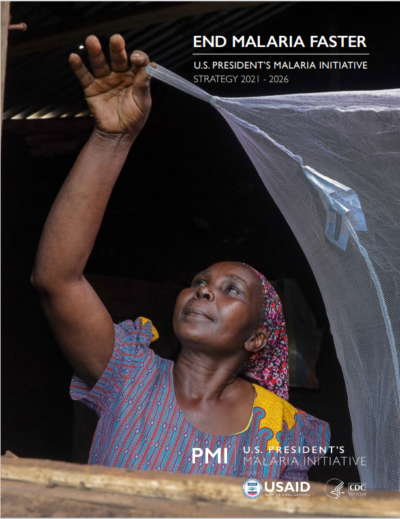End Malaria Faster: U.S. President’s Malaria Initiative 2021 – 2026 Strategy
Link to Document:
10.04Final_USAID_PMI_Report_50851.pdf
10.04Final_USAID_PMI_Report_50851.pdf

Abstract: The U.S. President’s Malaria Initiative (PMI) strategy for 2021 – 2026 aims to greatly reduce malaria deaths and cases in countries that account for 80 percent of the world’s malaria burden — contributing to the global goals of saving more than 4 million lives and averting over 1 billion cases by 2025.
Over the next five years, PMI aims to save lives, reduce health inequities, and improve disease surveillance and global health security. With partners, PMI will maximize program efficiency by addressing five focus areas; reach the unreached, strengthen community health systems, keep malaria services resilient, invest locally, and innovate and lead.
As a leader in the fight against malaria, PMI has contributed towards making significant progress in its 27 partner counties; 1.5 billion malaria infections have been prevented and 7.6 million lives saved. Although strides have been made, COVID-19, climate change, and conflict threaten gains. These disruptions have been evident in the COVID-19 pandemic as malaria testing rates dropped by 30 percent, leaving cases undetected and untreated.
Threats against past and future successes exist, but the world is at a turning point in the fight against malaria. Innovations to combat resistance, improvements in data and supply systems mean that optimal interventions can be deployed where they are needed most. Strong global partnerships can ensure a healthy, resilient market for lifesaving prevention and treatment products. New weapons against malaria are becoming available including vaccines, new types of mosquito nets and public health insecticides and medicines to fight resistance, and new rapid tests to catch infections that have evaded current diagnostic tools. This momentum and strategic application of malaria interventions will end malaria faster.
Over the next five years, PMI aims to save lives, reduce health inequities, and improve disease surveillance and global health security. With partners, PMI will maximize program efficiency by addressing five focus areas; reach the unreached, strengthen community health systems, keep malaria services resilient, invest locally, and innovate and lead.
As a leader in the fight against malaria, PMI has contributed towards making significant progress in its 27 partner counties; 1.5 billion malaria infections have been prevented and 7.6 million lives saved. Although strides have been made, COVID-19, climate change, and conflict threaten gains. These disruptions have been evident in the COVID-19 pandemic as malaria testing rates dropped by 30 percent, leaving cases undetected and untreated.
Threats against past and future successes exist, but the world is at a turning point in the fight against malaria. Innovations to combat resistance, improvements in data and supply systems mean that optimal interventions can be deployed where they are needed most. Strong global partnerships can ensure a healthy, resilient market for lifesaving prevention and treatment products. New weapons against malaria are becoming available including vaccines, new types of mosquito nets and public health insecticides and medicines to fight resistance, and new rapid tests to catch infections that have evaded current diagnostic tools. This momentum and strategic application of malaria interventions will end malaria faster.
Author(s): PMI
Year: 2021
Language: English
Filed under: COVID-19, Data, Detection, Malaria, Malaria control, Malaria Surveillance, PMI, prevention, strategy